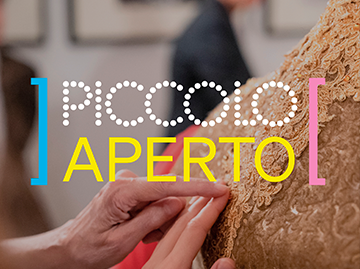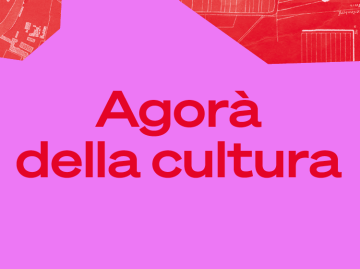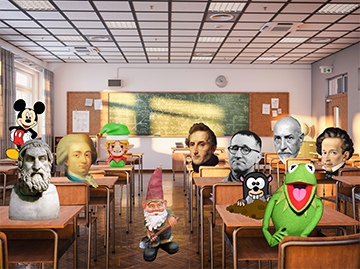Rosi Braidotti, a feminist philosopher, will discuss the posthuman and the nomadic subject, while Isabella Dalla Ragione, an arboreal archaeologist and expert in the protection of plant biodiversity, will lead spectators in the practice of botanical grafting on small wild apple plants in pots.
Chiostro Nina Vinchi
Rosi Braidotti, a feminist philosopher, will discuss the posthuman and the nomadic subject, while Isabella Dalla Ragione, an arboreal archaeologist and expert in the protection of plant biodiversity, will lead spectators in the practice of botanical grafting on small wild apple plants in pots.
Bud grafting is an action that not only does not compromise the plant, but actually reveals its vitality through its capacity to reproduce in this peculiar way. It is an ancient and very simple action, full of symbolic meaning.
Experiencing the union of a plant with part of another, forming a single individual, may help us - through analogy - to favour the intersectional nature of activism, which in this period of urgency is focused on climatic justice, gender equality and decolonialism.
Practising grafting as a political gesture is perhaps a utopian idea, but it could enable us to imagine forms of activism that are able to curb the mutation of subjectivity.
Rosi Braidotti graduated in Canberra in 1977, earning important recognition such as the University Medal in Philosophy. She enrolled at the Sorbonne in Paris with a scholarship, where she earned her PhD in Philosophy. She partnered with Gilles Deleuze and studied feminism and psychoanalysis, two themes that were to remain central to her evolution. At just thirty-three years of age, she obtained the first prestigious chair in Europe, for Women’s Studies at the University of Utrecht, and in 1995 she founded the Netherland Research School of Women’s Studies. Since 2007, she has focused on new humanist disciplines. Her latest book is The Posthuman (Derive Approdi, 2015).
Isabella Dalla Ragione, agronomist and Research Doctorate on Biodiversity at the University of Perugia, works on public green spaces and renaturalisation projects. She designs gardens and fruit orchards in Italy and worldwide. She is the founder and president of the Archeologia Arborea Foundation, a non-profit association that focuses on the conservation of biodiversity, and has written various books and taken part in documentaries on the subject. She won the Nonino Risit d’Aur Award in 2017 for her research activity into ancient fruit varieties and the protection of rural culture.
The event, part of the programme Ogni volta unica la fine del mondo, is part of Alleanze multispecie, which studies collective forms of examining our position in the world, posing the question of whether the ideas that take form as we interact in symbiosis with other species can generate a hybrid aspect capable of repairing the fracture between Nature and Culture that has characterised the Anthropocene.
Duration: 60 minutes without interval
Rosi Braidotti, a feminist philosopher, will discuss the posthuman and the nomadic subject, while Isabella Dalla Ragione, an arboreal archaeologist and expert in the protection of plant biodiversity, will lead spectators in the practice of botanical grafting on small wild apple plants in pots.
Bud grafting is an action that not only does not compromise the plant, but actually reveals its vitality through its capacity to reproduce in this peculiar way. It is an ancient and very simple action, full of symbolic meaning.
Experiencing the union of a plant with part of another, forming a single individual, may help us - through analogy - to favour the intersectional nature of activism, which in this period of urgency is focused on climatic justice, gender equality and decolonialism.
Practising grafting as a political gesture is perhaps a utopian idea, but it could enable us to imagine forms of activism that are able to curb the mutation of subjectivity.
Rosi Braidotti graduated in Canberra in 1977, earning important recognition such as the University Medal in Philosophy. She enrolled at the Sorbonne in Paris with a scholarship, where she earned her PhD in Philosophy. She partnered with Gilles Deleuze and studied feminism and psychoanalysis, two themes that were to remain central to her evolution. At just thirty-three years of age, she obtained the first prestigious chair in Europe, for Women’s Studies at the University of Utrecht, and in 1995 she founded the Netherland Research School of Women’s Studies. Since 2007, she has focused on new humanist disciplines. Her latest book is The Posthuman (Derive Approdi, 2015).
Isabella Dalla Ragione, agronomist and Research Doctorate on Biodiversity at the University of Perugia, works on public green spaces and renaturalisation projects. She designs gardens and fruit orchards in Italy and worldwide. She is the founder and president of the Archeologia Arborea Foundation, a non-profit association that focuses on the conservation of biodiversity, and has written various books and taken part in documentaries on the subject. She won the Nonino Risit d’Aur Award in 2017 for her research activity into ancient fruit varieties and the protection of rural culture.
The event, part of the programme Ogni volta unica la fine del mondo, is part of Alleanze multispecie, which studies collective forms of examining our position in the world, posing the question of whether the ideas that take form as we interact in symbiosis with other species can generate a hybrid aspect capable of repairing the fracture between Nature and Culture that has characterised the Anthropocene.
Duration: 60 minutes without interval
Credits
2° mondeggiamento: innestare il postumano
A lesson in botanical grafting and philosophical thought
with Rosi Braidotti and Isabella Dalla Ragione
moderated by Marta Cuscunà
video by Salvatore Billeci
Tickets
Single seat € 5
Click here for information on how and where to purchase
Safety measures for access to performances
- In order to prevent queues and crowding, we invite spectators to arrive at the venue for the show in advance of the scheduled start time.
- For access face masks must be worn (or an alternative form of protection approved by the Lombardy Region. Non-medical masks are prohibited). The face mask must be worn for the entire duration of the play. “Courtesy” face masks will be available for spectators who do not have suitable protection. Hands must be sanitised via the dedicated dispensers.
- Personnel at the entrance will have dedicated thermal scanners for measuring temperature. Spectators with a body temperature equal to or higher than 37.5°C will not be granted access.
- seats assigned guarantee respect for regulations regarding interpersonal distancing.
- Spectators are kindly requested to follow the instructions provided by the ushers as well as via audio and visual indications in the venue.
Organised groups and audiences
For information on tickets for organised groups:
tel. 02 72 333 216
email promozione.pubblico@piccoloteatromilano.it









